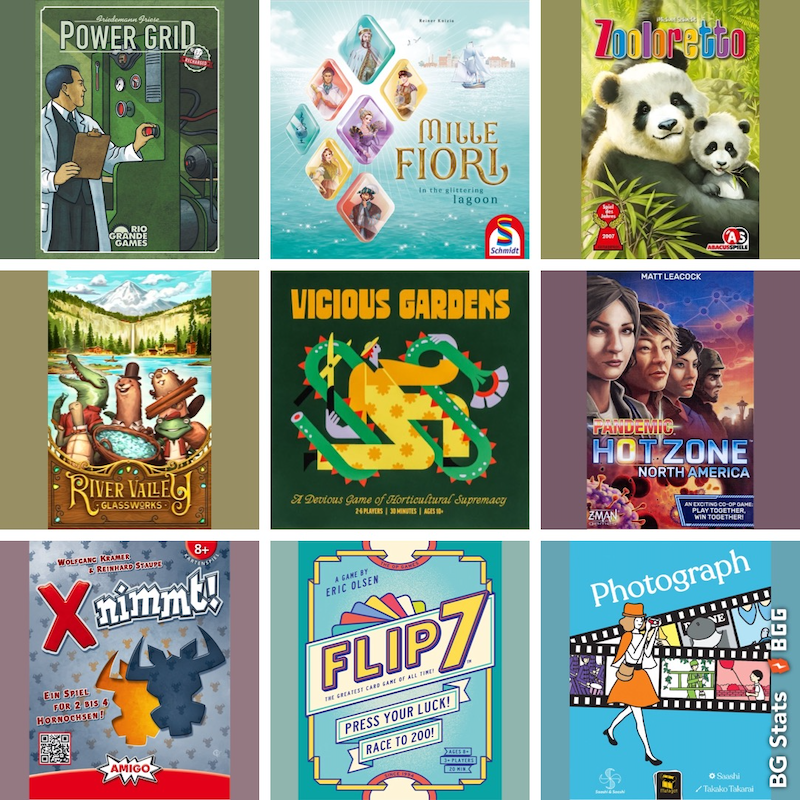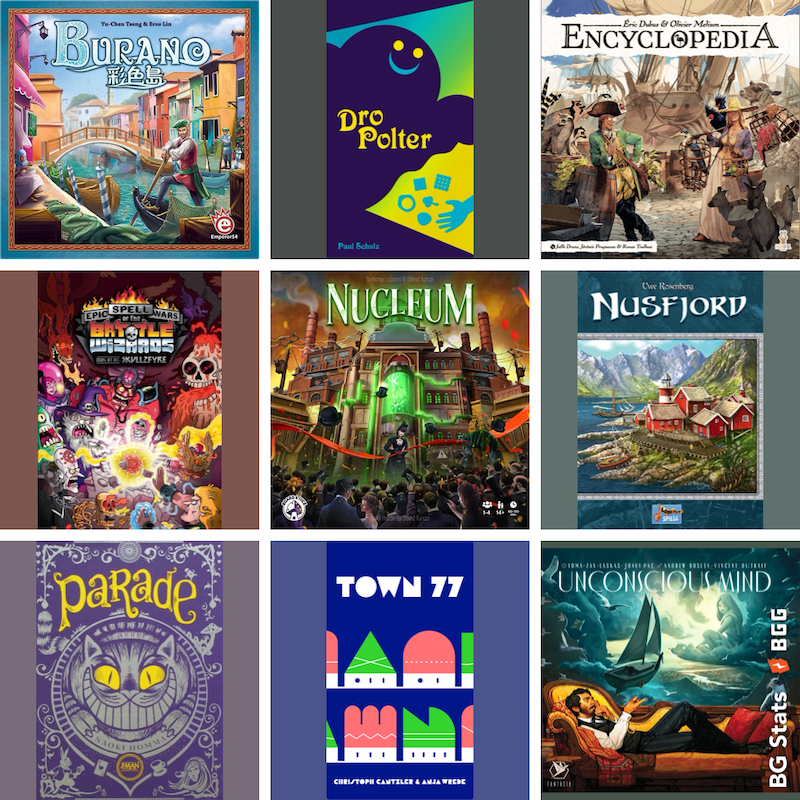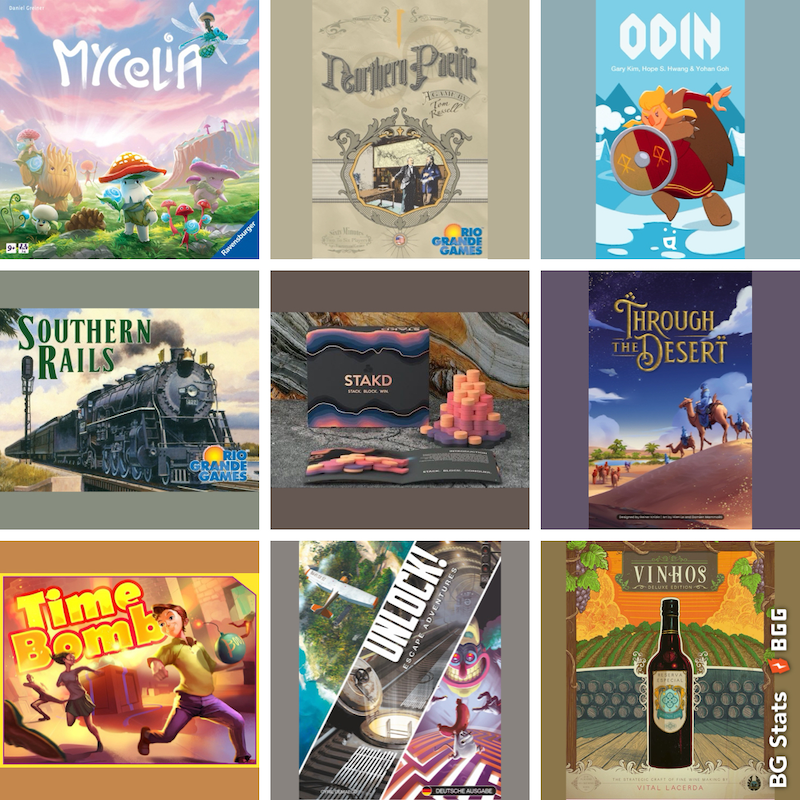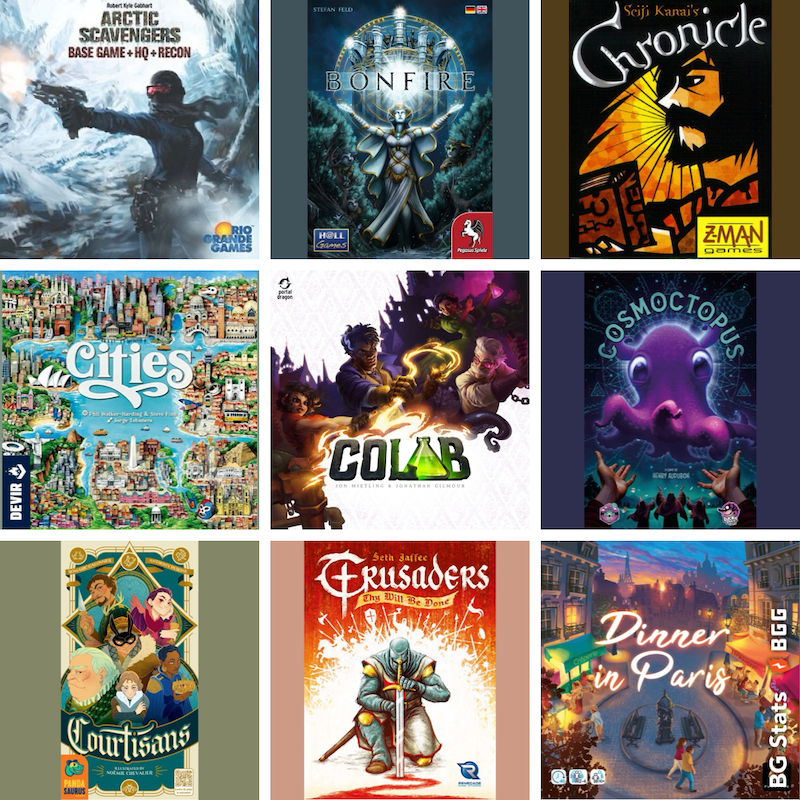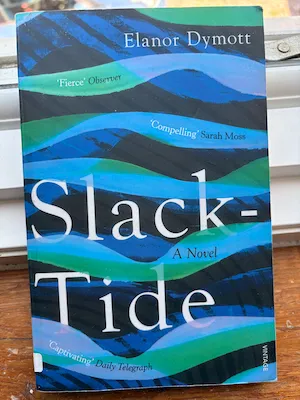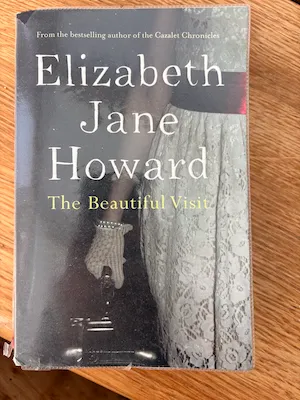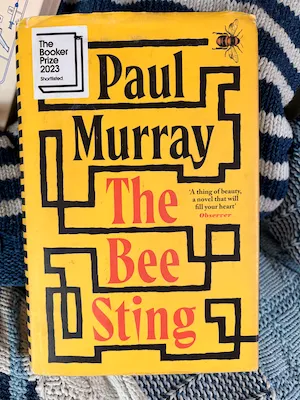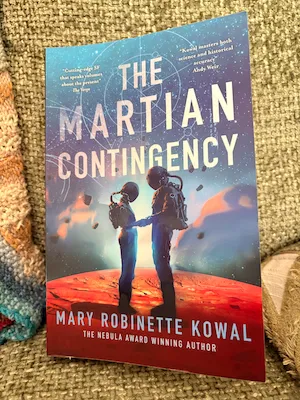September's New Board Games
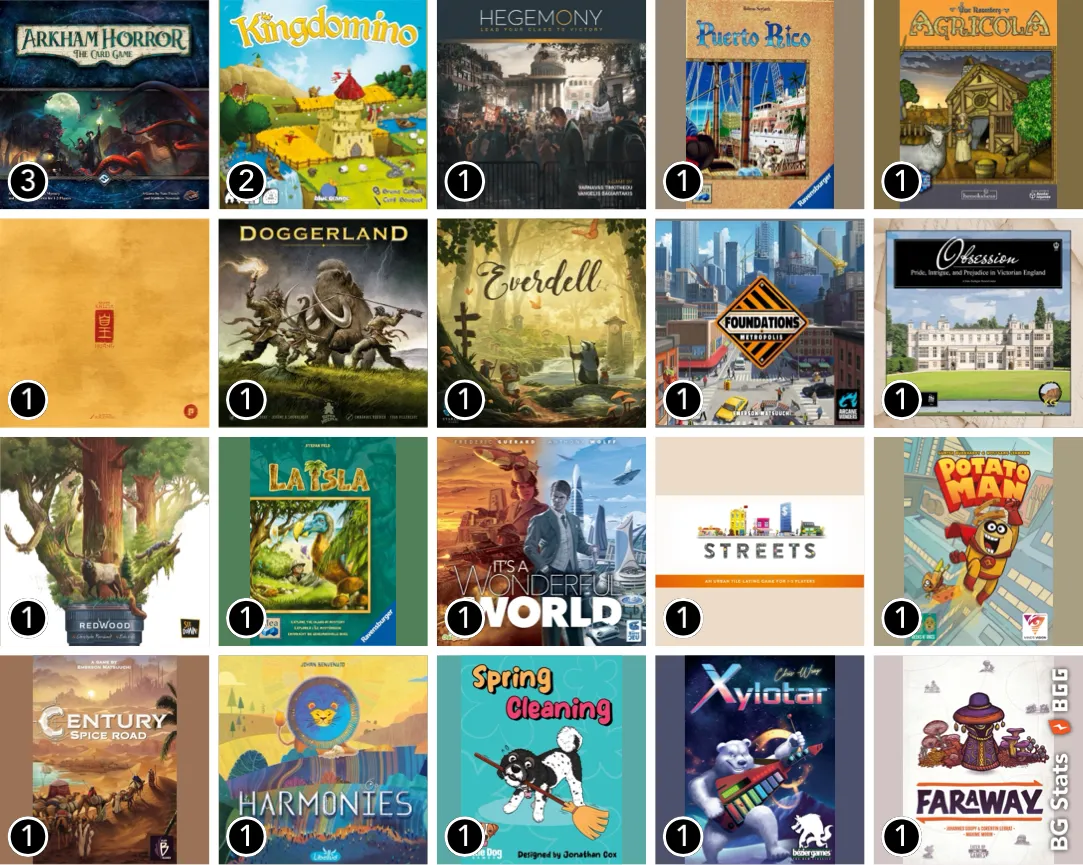
My resolution for September was to play less new games so I didn’t need to write so much up about them! It’s still taken me forever to get around to finishing this post though! A month of good big games but there was nothing much special about any of the smaller games I played.
Hegemony
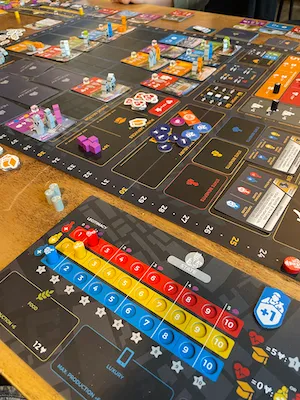
This was a chunk of a game! I think we started getting it all out of the box around 1330, by 1445 we’d just about figured out the rules and started the game. At 1815 we were getting to the end of the fourth of five rounds and we had to speed up because we got told the building we were playing in was closing at 1900. We just about got it all back in the box in time before security locked us in!
But despite the four hour plus playtime I really enjoyed it. Each player plays a different class of society - the working class, the middle class or the capitalist class, and in a four player game one player plays the state as well, and that was my role in this game. My goal was broadly to try and keep each of the other classes happy in more or less equal measures as well as dealing with various events that could throw the game off course. I enjoyed myself resolving the crises in ways such as giving away all the health care in the nation as foreign aid, in handing out luxury goods benefits to the capitalists who didn’t need or want them, and it was also funny to watch how we ended up with stuff like the working class being the ones with the most money. It’s an economic simulation but it doesn’t have to play like the real world.
We got a few rules wrong and slowly corrected them over the course of the game. There are a lot of bits to the rules but it all came together pretty well in the end. The problem with it as an asymmetric competitive game is that you need to know how all the other players are scoring points in order to combat them and I only just about had a handle on how to get my own points. I managed to win the game by scoring a load of points for the resources I had left at the end of the game whereas I’d thought the working class had won easily from the amount of points they were accumulating each round but they didn’t have the end game scoring opportunities that I did.
Redwood
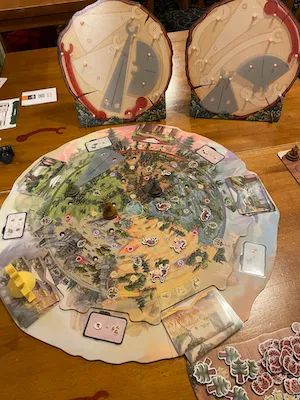
This was a big game with huge table presence, but actually quite light gameplay. Which was nice actually, especially as it wasn’t my money that went on getting it! I love the theme of trying to take the best photos of wildlife.
It’s a spatial puzzle where you try to figure out which of the physical path pieces will let you move your photographer into the right place where a physical lens template will determine whether you have the right elements in the shot. I’m not usually that good at this kind of puzzle but somehow it came together for me here.
It was really nice and I’d happily play it again anytime.
Doggerland
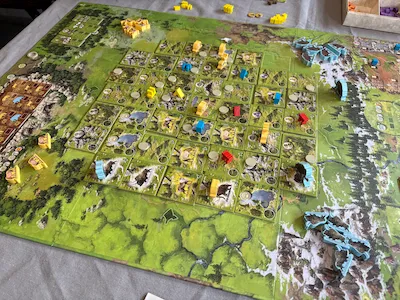
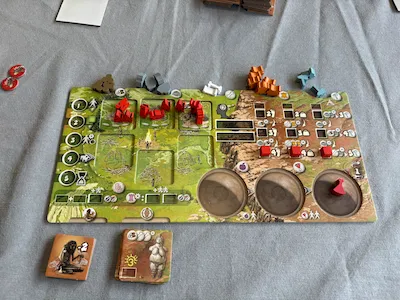
Stone Age was one of the first worker placement games I ever played and whilst it’s certainly not just a kids game this still feels like the grown up edition for gamers in comparison. It’s not just the theme that’s similar. This is obviously set in Doggerland, a name my gaming group found hilarious but screams ‘shipping forecast’ to me. The real Doggerland is the region that got buried under the North Sea about 10 000 years ago. Like Stone Age you have a small band of workers who need to collect resources and do stuff with them: collect food, hunt animals, do handicrafts, paint pictures, and probably some others that I’m forgetting. One of your workers is a shaman who can do a whole load of extra things culminating in building megaliths for mega-points.
I liked the way the seasons changed in the game. In winter it was harder to get resources and any workers sent outdoors needed furs to protect them from the cold. And the animals roamed around if they didn’t get hunted down straight away. There was nothing hugely innovative about the game but it was fun to play and I’d happily have another go at.
Foundations of Metropolis
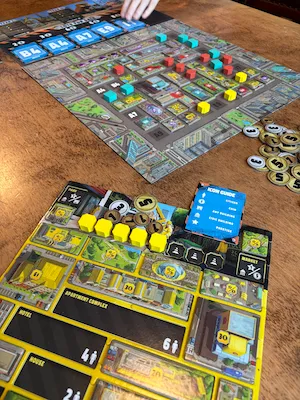
Foundations of Rome is a $$$ game with lovely miniatures and light gameplay. This is the cheap version of the game for the rest of us that’s just cardboard tokens. They are however some rather nice cardboard tokens! The core of the game is buying up lots on a central board which each player then places buildings down on, collecting money and points for putting your buildings in the right places next to others. I really liked how the game packed away with the tokens on each board stored ready for the next game which means that you don’t have to spend half an hour sorting tokens out in order to play a half hour game. It was well designed from a rules point of view as well, I think we could probably have figured most of it out without opening the rulebook.
La Isla
I would have guessed that this game was a lot older than it was, it was published ten years ago but the artwork and very cheap feel to the cardboard made it feel like it had probably been around a lot longer. The game play was interesting though. You get a hand of three cards that can each do one of three things and have to secretly choose which one to use for which thing whilst your opponents do the same. The cards let you collect different resources in order to surround and capture different animals on the island board; and also manipulate which animals are worth the most points. There were interesting decisions as you can’t help but help your opponents out sometimes.
I didn’t realise it was a Stefan Feld designed game when I was playing it and once I realised it was I was surprised that there hadn’t been a more recent higher production value version of it. Then I found out there had been; it was revamped into Vienna in the Cities Collection and reimagined as a search for spies in the city.
Potato Man
Or Yet Another Trick Taking Card Game. In this one there are four different coloured suits and each player can only play a suit that hasn’t already been played. (I think the three player game removed a coloured suit, and a five player game let two players play the same colour which seemed like it could be interesting, but I might be wrong on those as I played a game with four players.) And each suit has a different range of values. And winning suits of different colours awards you different amounts of points. There’s also a nice wrap around feature where the bottom cards of one of the suits features Potato Man and he beats the otherwise highest cards of another suit featuring Fry Guy. I think those were the character names anyway!
It was ok, but nothing more than that. I don’t mind playing trick takers occasionally but I seem to have played a lot recently and I’ve still never met one I’d want to own.
Spring Cleaning
Honestly, sometimes a game is completely forgettable. A couple of weeks later and I can barely remember this game. It’s one where you aren’t allowed to change the order of the cards in your hand as you try to play them in sets to the table. Whilst I don’t think the game was terrible or anything it’s very similar to Scout, which does it better.
Xylotar
This one was more interesting if still not very exciting. You arrange a hand of cards in order and pass them to your neighbour who can then see what suit each is but not their values. So you are trying to win tricks and also deduce what your own cards are. Probably my favourite of the three small games I tried this month, but none of them were particularly great.
